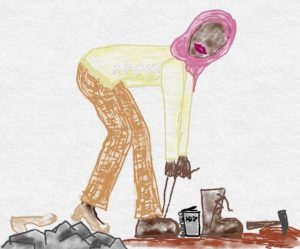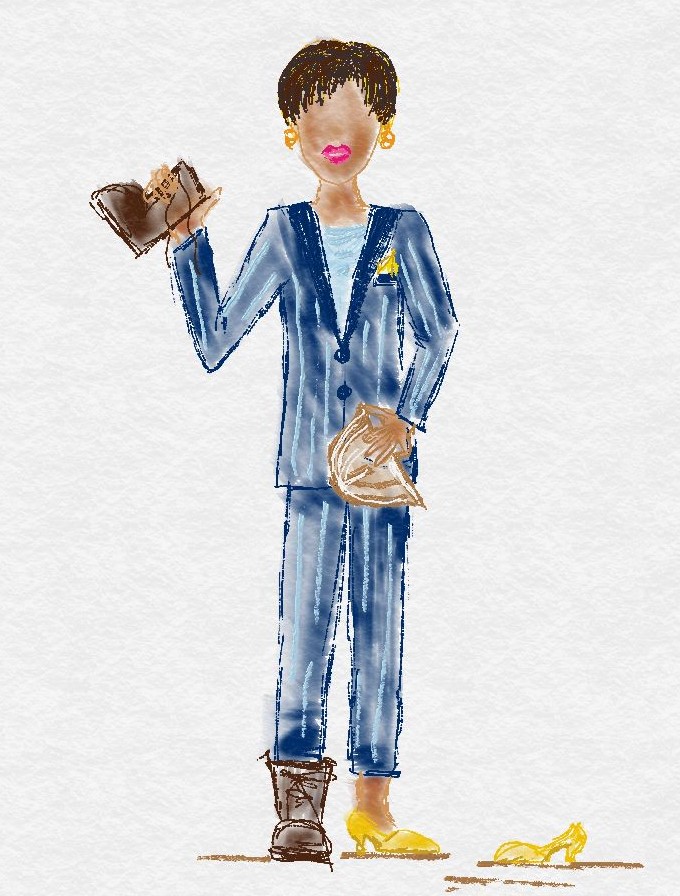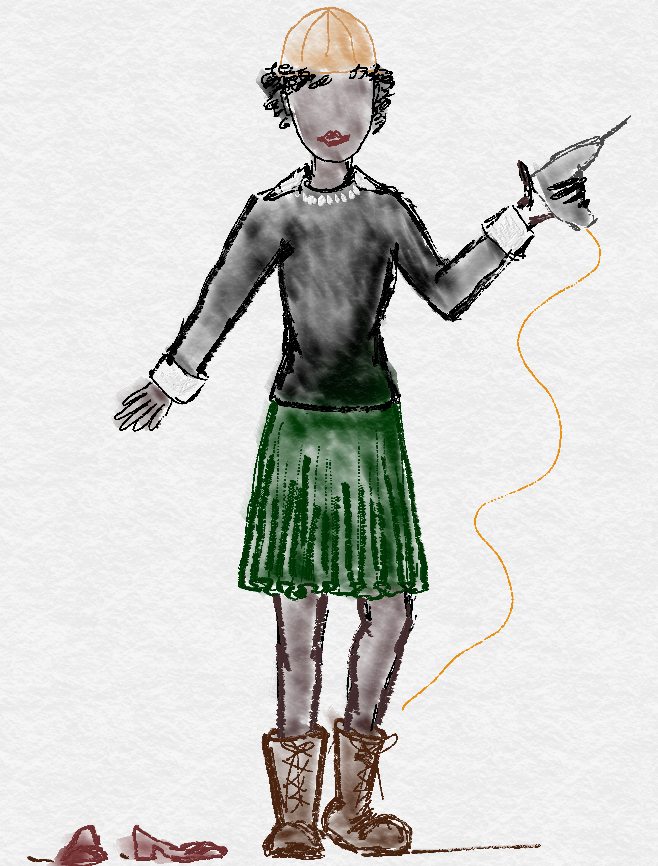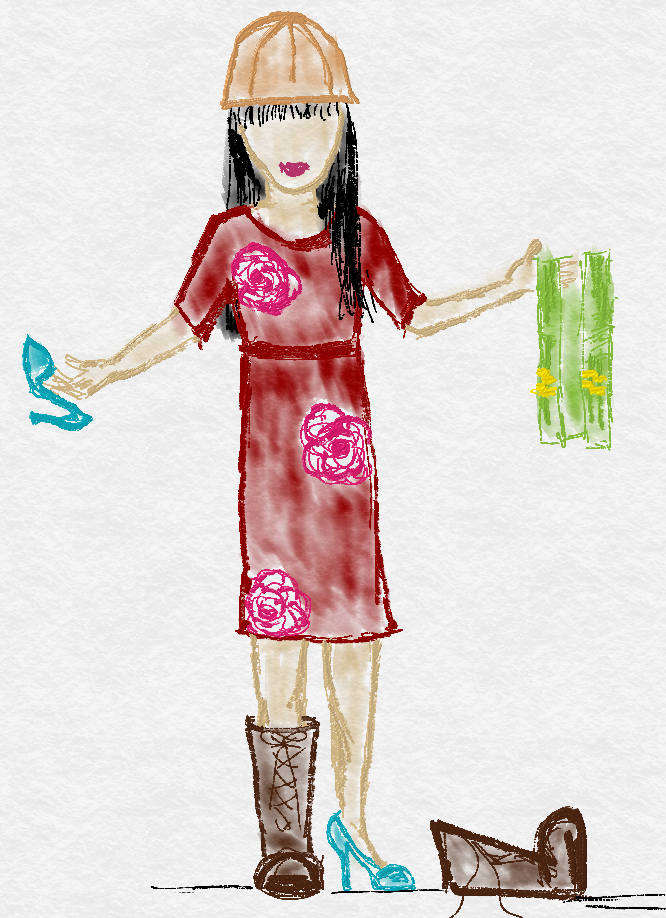Helen Robinson
The Power of Affirmation
Positivity is Power

Lately I have been thinking more about how powerful affirmation can be. When I was younger, I assumed that people who are good at what they do, know it. I didn’t always think about acknowledging people for their skills, or what effect that might have on them. My Mom continuously emphasized the importance of writing thank you notes not only for gifts, but when someone does something for you. As kids we found this to be a real drag and it seemed an insurmountable task to write a few lines in a card. We would contend that we had already said thank you to Aunt Gayle in person upon receiving the gift, so why did we have to say it again. Mom would patiently explain that taking the time to write the card and send it was very meaningful and it made the person feel good to receive it.
I have been working on introducing my 7 year old Gabriella to these same concepts. During this year’s Girl Scout cookie sale, Gabby received several generous donations from my friends. They didn’t want the cookies, but wanted to help her reach her goal of 200 boxes and support the Girl Scout tradition of promoting confidence, character, leadership, and entrepreneurship. The boxes they bought were donated to U.S. soldiers serving overseas. Gabby was not thrilled when I had her writing thank you notes, even though she has personalized note cards and return address labels, as well as Wonder Woman stamps. Upon receiving Gabby’s card, one friend reached out and said that it made his day to receive it and that he smiled every time he looked at it. Then he said “Great job mom!” and I can’t tell you how much that meant to me. So apparently, there is a whole lot more to thank you notes than I had ever realized. Letting people know that they are appreciated or when they are doing something well can be very powerful.
Last week my high school band director passed away suddenly at age 60. He was the epitome of inspiration. A phenomenal clarinet player who performed at Carnegie Hall with legendary greats such as Andrea Bocelli and Luciano Pavarotti, Mr. P chose to spend the bulk of his time instilling his love for music in 9th to 12th graders. Now looking back, I wonder how he had the patience to work with us and help us create performances that we were proud of. He emphasized that every part in the band was important, no matter how small. During my clarinet lessons, if I was working on a difficult solo or preparing for an audition and felt overwhelmed, Mr. P. would use one of his favorite sayings “How do you eat an elephant? One bite at a time!” He motivated me with words of praise when I accomplished something that I had been working hard at, and endorsed me in front of younger students who were just starting on their musical journey. He had done the same for those before me, so I had older students and more accomplished musicians to look up to and younger students to mentor and encourage. I hope that he knew how much he taught me about life and about achieving goals. I wish I could have told him one more time.
Not long ago, I expressed to a colleague that it’s important to me to be acknowledged. If I manage a project well or achieve a milestone and it is recognized, I am even more highly motivated. He commented that some people need affirmation while others don’t, and he would rather receive a raise or a bonus. But money is just another form of affirmation. People who say they are “self-motivated” or “driven” still need affirmation in some form. It may be receiving tenure, getting comp time for long hours in the field, being invited as a keynote lecturer, winning an award, getting a promotion, a shout out in the company newsletter, or banking money for retirement. No matter what types of affirmation motivate you, they make you feel good and increase performance and productivity, or at worst, get you through one more month of night work to finish the project.
Are talented women and men leaving the industry because they haven’t been motivated by some form of affirmation? I believe they are. I think the most effective managers (and band directors), learn what motivates their team and use it to advance their projects and their company. I have been privileged to work for an amazing mentor that does this so naturally that it looks effortless. For others of us, it requires more thought, especially when faced with projects that stretch the limits of your team’s technical experience or with limited time or budget. But I believe affirmation and endorsement of your team members is well worth the time and effort it may take you. If you are worried that complimenting your boss or manager is going to make you look like a suck up, please get over it. Supervisors deserve affirmation too.
If you think some of your team members could be performing better, ask them what motivates them and set mini goals for them to work toward. Many people lose motivation when there is no end in sight or when they don’t understand why they aren’t being promoted for example. Don’t assume that your stellar performance speaks for itself. If you think you should be progressing to the next professional level, request an interim performance evaluation where you can talk to your supervisor and come up with a list of things that you need to do to get there. Appreciate that for supervisors this may be very difficult to put into words. The company may not have specific criteria for each staffing level and your supervisor knows you aren’t “ready”, but doesn’t have guidelines to refer to. There is often the “chicken or the egg scenario” where the employee isn’t being given the opportunity to manage projects because they have no experience managing projects. It isn’t always practical or possible to start someone off with an easy project to manage (does that exist?) because it depends on the current backlog for the company or whether there are field projects that need to be staffed for example. But although it will involve some difficult conversations and effort for both supervisor and supervisee, this type of candid management is what the industry needs to grow responsible and assertive engineers. It all goes back to affirmation and how you use it to your advantage.
One more personal anecdote: I was at the dr. for a routine visit. Mine has paperwork that asks questions about family dynamics and how much you sleep and what activities you are involved with. She looked up after reading it and said, “I don’t know if anyone has told you this but I just want to tell you that you are a Rockstar.” Well that made my whole week. Maybe she did it because she likes getting my co-pay or out of pity because of the dark circles under my eyes, or maybe she really did think I was the next Stevie Nicks. I don’t care which if she keeps the compliments coming.
So share the wealth! Thank your mentors and teachers and those who inspire you. Let your staff know when they are doing a good job. If you are in a position to award spot bonuses, try to use the pot up and ask for a larger budget next year. A $50 Amex gift card or tickets to a sporting event may not seem that significant to you, but it could make a difference in someone’s outlook. Harness the power of affirmation to the advantage of you and your team!
Patterns for Success
Respond, don’t React
by Mia Painter, Guest Contributor

I was raised in a small family of women – mom, gram, two aunts, and a few cousins. My family had started out with some men, but the year I was two my grandfather and uncle died and my mom left my abusive father. I remember the women around me as strong, self-sufficient, generous, flexible, but only at times sensitive and outwardly loving. They all encouraged (and expected) me to do chores (lots of cleaning and mowing the lawn), to explore (keeping pet worms and having areas of the yard I could turn to mud factories), and to stand up for myself. Most importantly, I think, to who I am today – they expected me to do what I wanted to do, regardless of what those around me said. But here’s what I’ve been pondering lately…I think what I took from their lessons was to react, not to respond. My pattern of reaction (and not response) led me to where I am in my career. I’m (generally) happy with how my career has worked out but I wonder how it would have been had I responded more and reacted less. So now I’m starting to look at how I can respond to career situations and move forward with intention, not just reacting to situations with a gut reaction.
Reacting is what we instinctually or quickly do when an event or a decision or a confrontation happens. To me, reacting happens when I see something unjust or am exposed to a hard situation – and become angry or defensive or hurt. It also occurs when I see something as a challenge and charge forward to meet it head-on without much forethought.
Responding takes more effort and involves thinking things through. Responding means I keep my calm, think about what happened, and make an active, conscious decision about the best course of action (or inaction) to take. Responding isn’t always slower than reacting (though it certainly can be) but it is always about seeing a bigger and different perspective around the situation.
The most vivid memory of me reacting as a kid was in kindergarten (although it’s one of those memories that is now warped by my mom’s telling me about it so many times, so it’s a blend of my memory plus her story). It was free time and a boy (Brad) told me I couldn’t walk on the desks. Now maybe he meant that I shouldn’t, or that it wasn’t appropriate to stand on desks in school. But I heard him tell me I couldn’t do it and so I immediately took it as a challenge. I climbed up on the little kindergarten sized desks in my Catholic school jumper and walked around from desk to desk while the class looked at me in surprise. As you can expect, I was told to get down and to go to the principal’s office. My mom came to pick me up and asked what happened. I said Brad told me I couldn’t walk on desks and so I did. She told me good, that’s what I should have done! (And then followed it up with a discussion about appropriate times to walk on desks – i.e. not in class.)
Flash forward to college…end of my sophomore year and I had taken a variety of general classes but had not yet declared a major. My advisor told me I needed to pick a major now. I made my decision there and then in his office, and chose geology. Don’t get me wrong, geology is a good fit for me, but I didn’t do any long-term planning – I didn’t do any of the things I’d advise anyone who was choosing a career! I didn’t research options, would I need a master’s, what field of geology would I go into, what geographic region would I live in? I had taken “Geology for Consumers” the prior semester and it had included a field trip (as all good geology classes should). But something sparked in me that day when the class got out of the school van on the side of a road on top of a hill (all very much a typical day). That was the day I learned that I wasn’t just standing on a hill…I was standing on a drumlin! (A drumlin is an elongated hill formed by glaciers.) The hill got there somehow. The valley got there somehow. There was a process, a history, a predictable order to the landscape around us. I’m pretty sure that’s what my gut reaction was stirring up months later in my advisor’s office.
Ok, so I chose geology as a major. A year in and my new advisor suggested I double major and add in geophysics. I saw it as a challenge and agreed right away. Agreeing meant adding a year onto my undergraduate work, and it meant taking a slew of math and physics classes as well as geophysical coursework. Then I chose a graduate school and landed into the research that my advisor suggested. I was content, happy even. I got a job, moved, got married, had two babies, and kept working. All of this just happened as a series of my reactions to events that presented themselves to me. Each time I took the next logical step from where I was at any given moment.
But now I’m trying a different way. A few years ago while struggling with a loved one’s addiction, I learned the phrase “Respond, don’t React” and I applied it consciously in all aspects of that relationship. It helped me distance myself from the craziness of addiction enough to take care of myself. I eventually could see my loved one with a different perspective and it helped me continue to love them even amid the craziness. It helped me feel calmer, more in control of myself. In the past year I’ve had some challenging interactions with clients and staff, and one day the phrase “Respond, don’t React” came to me again. I realized I could apply this to my career as well – mainly in my day-to-day interactions to keep my calm and not do anything I’d regret!
Now I’m looking at my long-term goals and I’ve had the revelation that I can respond in situations and with decision-making to lead me to those goals. It had never occurred to me before the last couple months to me to write down career goals, and then to actually do something to achieve them. I’m not sure why this concept wasn’t part of my life to begin with – seems like it should be standard…have goals, do things to achieve them. But I can see now that a lot of my childhood was observing the women in my life reacting to their situations – grieving, moving on, getting out, raising kids, making ends meet. So many years of just doing the next logical step led me to this place, here, right now. It’s a pretty decent place. But now I want to try responding to the next career crossroad, situation, choice, and goal.
About me:
I’m a geologist and geophysicist for a civil engineering company. Much of my thoughts lately (when not focusing with all my might to meet deadlines, or to snuggle my boys, or to not be late for date night with my husband, or to keep our pet goldfish alive) are looking at how the decisions we all make shape our careers and the careers of those around us – particularly for women in an industry with mostly men, and for men in an industry with only a few women. Thanks Helen and Peggy for having me be a guest, it felt nice to have thoughts and to then write them down! Maybe there’s a pattern here.
Finding Your Voice
Speaking Up and Speaking Out

Recently I have had conversations with some of my friends and colleagues in the industry to try to explain a phenomenon I can’t quite wrap my head around. In a situation where there are a large group of professionals, are women are more inhibited to voice their opinion?
Here’s an example: the Deep Foundations Institute (DFI) holds an annual Hal Hunt Lecture on Communications. In 2015, the guest lecturer was Billy Beane, former professional baseball player and owner of the Oakland A’s. He is famous for applying statistical analysis to the evaluation of players. Beane delivered his lecture to a standing room only crowd which consisted of perhaps 90% men. Following the speech he entertained questions, all of which came from men in the audience. I am stereotyping but you could argue that the men who asked the questions were sports fans, or A’s fans (the conference was in Oakland), or fans of Beane himself. Now fast forward to 2016, when DFI’s Women in Deep Foundations Committee solicited sponsorships and selected the first female Hal Hunt lecturer- Dr. Mae Jeminson, the first African American woman in space. Dr. Jemison was a very captivating speaker, especially because she “nerded out” for a group of well, nerds. The audience in this case was very similar to the prior year: about 85% male. Unfortunately, there wasn’t much time for questions afterward— Dr. Jemison could only entertain 6 or 7. But not one of them came from another woman. I have to admit I was very disappointed about that. Why? Because I wanted to visibly express how important and significant it was for the women in the room to have her there.
In the Beane lecture I was trying to think something to ask him, for the sole purpose of being a woman who spoke out with a clever question. Nothing came to mind, and if I couldn’t think of a good question then I didn’t want to ask it. Also, I only began trying to think of a question once the Q & A period began, not throughout the lecture. So when Jemison spoke, I was prepared. As chair of the WiDF committee, I had the extreme honor of meeting Jemison and introducing her. I didn’t want to take any more floor time by asking my own question. But I could recruit others for the cause. As attendees gathered for the lecture, I scurried around and asked about 10 different women if they would consider asking a question following the lecture. I held the microphone at the talk’s conclusion and brought it over to those people raising their hands with questions. But as far as I could see, not one woman held up their hand while the room was full of questions from men.
I am trying to understand this better. I can tell you some general thoughts and preferences I have about speaking up in a crowd. I am generally content to listen passively to a debate or discussion unless I feel strongly about the point I am making or have a motive behind speaking up (e.g. visibility). If I don’t speak up it doesn’t mean that I don’t have an opinion. But I often keep quiet and absorb what is going on in the discussion. I also know that if I am putting effort into formulating a response, I don’t get as much out of the dialogue.
I don’t respond well to someone urging me not to be shy or to “come out of my shell”. This isn’t an issue of shyness. Those who know me well know that beneath my (hopefully?) sweet and personable exterior I have a strong personality and I am very vocal about things that bother me or excite me. In a group setting this often doesn’t come through. Sometimes I don’t feel like exposing myself and would rather make a more personal connection one on one or in a smaller group. I would much rather stay quiet on many group topics including technical issues (unless it is the corrosion protection of soil nails).
I must also admit to waiting to get a feel for the flavor of the participants in a group conversation before sticking my neck out. I wait to hear part of the discussion to get a better idea of whether my thoughts will be well received and will resonate with others in the crowd. Why? I have yet to see a Facebook debate about politics, sleep training your child, or whether cauliflower is a valid pizza crust that ended with someone being swayed to the other side, or even ended in a civil manner, so I often think what’s the point of even trying?
Now let’s talk about why my question had to be a good one. We’ve all heard the phrase “there are no stupid questions”. And I absolutely agree with that…unless they are my own. I want my questions to be thorough, respectable, and witty if possible. I want to impress the person I am asking with the depth of understanding that I have about the topic, but appear humble and willing to receive the knowledge they are about to impart. Not to mention bonus points if the question is useful or meaningful for other listeners as well. I am slowly but surely working on these inclinations. I believe this is one of the hurdles that many women need to overcome: to stop judging ourselves so harshly.
There are times when I am on a conference call for example and don’t follow the line of conversation. In the past I was embarrassed to ask for clarification, and assumed that I would figure it out myself later. I didn’t want to hold up the call or inconvenience anyone. This goes hand in hand with a propensity to apologize for things. My softball coach tried so hard to break me of that habit. When I threw a bad pitch in practice I gushed sorries at him and the catcher. But you know what they say, there’s no sorry in softball!
I think these tendencies are factors in some women avoiding STEM careers. A study (Dweck 2007) found that 5th grade girls routinely outperform boys in school subjects, including math and science. But when given an unfamiliar or complex subject, girls were quick to give up—those with higher IQs were actually more likely to quit. Boys saw the difficult material as a challenge and redoubled their efforts. Realizing these general predispositions can help us mentor young women in our field as well as save us from ourselves.
So, should we force ourselves out of our comfort zones? Men that I have discussed this with have assured me that it is just as difficult for many guys to speak up in a group setting. Some have indicated that throughout their lives it has been less socially acceptable for them to keep silent, so they have been forced against their introverted personalities to be vocal. I am glad to hear this type of revelation from men because it reinforces the point that personality and environmental influences are major factors as well. Of course there are also plenty of men and women who like to hear themselves talk.
One male colleague that lent his wisdom on the topic pointed out that all of these numbers and observations are skewed by the male to female ratio in geotechnical engineering. So something that seems to be an overwhelming pattern, such as only men asking questions at the DFI Hal Hunt lectures, actually makes sense for the high percentage of men in attendance.
In conclusion, I believe we need to speak up and speak out, even if it goes against our natural affinities. Do you feel comfortable speaking out or do you have to force yourself to be vocal?
Emotional Factor of Safety
Crying At Work (About Work) Isn’t Okay
Women are often stereotyped as being emotional, flighty, weak, and thinking with their hearts and not with their heads. Men can be portrayed this way too- if a man tears up at an emotional scene he is “in touch with his feminine side”.
Engineers and scientists on the other hand, are typecast as being analytical, impartial, and unemotional.
So women can’t be engineers and scientists then right? It just wouldn’t work out. How can a woman focus on calculations or problem solving when she is feeling sorry for the client who now needs 6 ft rather than 5 ft diameter shafts?
I have seen women in my profession intentionally present a starkly unemotional image. They put a Factor of Safety on sensitivity and overcompensate to the other extreme to appear stoic and reserved. This may be because they think that will fit in better, that they prefer to keep their feelings private, or that they are worried about making others in that environment uncomfortable.
I don’t object to any of that. If you truly have a reserved personality, I am not implying that change is needed. But if you are suppressing your sensitivity, do yourself and your co-workers a favor: to thine own self be true!
You: In-Situ
I believe that one peripheral reason why women are leaving the STEM field is because not only do they feel that they can’t express their true personality at work, but they feel that male co-workers won’t understand or care about their lives outside of work.
How often do we hear the catchphrase “work/life balance”? I might as well continue with the stereotypes on how each generational group in the workforce interprets this catchprase. Baby Boomers are too busy industriously working to stop to think about that question… Gen Xers are content with getting in a round of golf, a pedicure, or a family outing over the weekend before heading back to the grind on Monday. To Millennials it means to build a wall between the two; leave work at work and home at home and fiercely defend your personal life and time. But perhaps an unintended effect of this attitude is that Millennials feel stifled and mechanical in the workplace. This strategy may work in a more solitary, fixed-hour profession, but most of us in the geotechnical field spend over 50 hours per week on the job, whether in an office, on a project site, or traveling and meeting with clients.
So I say: it’s okay to be you. Even in the office. The more you show who you are (while remaining professional) the better you are going to perform as part of a team. It will also be easier for team leaders to understand how to utilize your strengths. A colleague recently pointed out to me that when you hire someone, you can’t pick and choose which of their qualities you get. You can’t have their strong analytical abilities but not their shyness, or their great public speaking skills but not their tendency to get stressed about deadlines. So rather than suppress your personality traits, follow this year’s Girl Scout cookie slogan “Be Unique, Be You.”
I don’t know if what I said earlier about Millennials is accurate- after all, I am not one of them, but I am advocating for breaking down the wall between your profession and your personal life. If we share our struggles and triumphs then workplace communication will improve and lead to better problem solving and increased productivity which often translates into profitability and who can complain about that?
So share the 10K you are training for, the videos of your kid making that adorable noise, or that you binge-watched episodes of The Walking Dead all weekend.
I believe we should also share the hardships that we face in our personal life as well. This is an extreme example, but it’s something that I think we need to talk more about as a society anyway, so I’m plunging ahead. Between babies #2 and #3 I had a miscarriage. It was heartbreaking and very emotionally draining. I debated telling my supervisor and the managers of projects I was working on. I knew another co-worker had experienced two miscarriages but chose not to say anything. Ultimately I decided it was the right thing for me to do. I wasn’t asking for special treatment or time off. I was looking for support and understanding, and I was overwhelmed with the outpouring of compassion that I received. It really made the situation easier to handle, and I didn’t have to hide my feelings and emotions and pretend that everything was okay.
There’s No Crying in Stratigraphy
Having said all of this, I will now present the other part of my dichotomous message: “Please don’t cry about work while at work!” As a member in good standing of Criers Anonymous, trust me when I say that I understand the magnitude of what I am asking. My eyes fill with tears when veterans march by in the community Fourth of July parade, and when I see my kids meet Peter Pan at Disney World, or when something reminds me of my grandmother who passed 11 years ago. I cry at both happy and sad things and most often when I am tired and/or frustrated.
So I understand. You’ve put a lot of time into that concrete beam design. You’ve brought it home for the past two nights to work on and checked and double checked your calculations to account for the high shear forces. But now at the last minute, the project manager decides to go with a steel beam instead and you will be at the office until midnight redoing the calculations yet again.
I don’t care what you need to do to prevent it, but put forth a great effort not to cry in front of your co-workers (in particular your supervisor) about work. Take a quick break, excuse yourself to run out and grab a cup of coffee, or if you’re Peggy, a new shade of lipstick at the drug store. Turn on the waterworks if it will help relieve some of your tension while you take a little break, but return to get the job done.
Sometimes you don’t have the luxury of a quick escape. You are stuck in a meeting or a one-on-one performance evaluation with your supervisor where you are facing criticism. Try your best to remain professional and not get caught up in the emotions of the situation.
My rationale for this supplication is that people react in a variety of ways when they see another person get emotional- from pity and sympathy to annoyance and disgust. For you it may be a way to release your feelings and end up refreshed and ready to tackle the next problem. It may be a tool that you use to prevent frustration from building. But by crying in the workplace about work issues you are distancing yourself from your co-workers, both female and male. Your crying can be interpreted as manipulation, or that you are too stressed to adequately perform your job. It may come across as immaturity or trying to evoke sympathy from a female or male superior.
Humans, both male and female, can be affected by extreme displays of emotion. Someone with a flaring temper can be intimidating and aggravating to those around them. The co-worker who is consumed with persistent indignation about their underserved bad fortune can be a distraction and an annoyance to others. One male colleague confessed to me his inability to think straight if a woman came to him crying about a technical issue she didn’t understand, for example. He couldn’t help but think of his mother and his sister and be overwhelmed with empathy. He would provide assistance, even to the detriment of his own deadlines. Afterward he felt resentment about the situation because he felt exploited, particularly if it happened repeatedly.
A couple of years ago, I worked on a very complex support of excavation design for a property owner. It took weeks to complete; the time commensurate with the level of risk involved. The project was intense and I spent many hours conversing with the structural engineer and the owner, educating them on the design assumptions we were making. Because of the time-sensitive nature of the project and construction finesse required, we recommended a specific specialty contractor that we trusted to handle the complexities of the project. When the contractor came on board, they told the owner they could redesign the excavation support more efficiently. We explained to the owner that the design could certainly be completed effectively with less retaining force, but considering the myriad variables involved, we recommended the more robust system. At the very least, if the contractor’s proposed system was used, the instrumentation monitoring program should be expanded. The owner elected to do neither, and hired the contractor to redesign the support of excavation. When I found out, I was furious and so upset that I burst into tears. I cried to my supervisor and co-workers and anyone who would listen. I was moody and depressed about it for a week. I vowed never to speak to anyone from the offending firm. Looking back, I wish I had not made such a scene. After all, business is business and ultimately it was the owner’s decision to make. We got paid for our work and have continued to work with all parties involved on other endeavors. But I know that I negatively impacted some of my co-workers’ opinions of me, particularly the staff that assisted me on the project. Since then, I have made an effort to rein-in my emotions on project-related efforts and set a better example.
So, bring your true self to the office but enough of that sniveling, buck up and join me in this No Crying Zone. If you disagree, I’d love to hear it…I’ll just try not read your comments while watching videos of soldiers returning home to surprise their children.
Field Work Uncovered
The Ins and Outs of Field Work
I have almost 20 years of (non-continuous) field experience. This does not include my childhood, part of which was spent climbing trees to find the perfect quiet place to read. My first official geotechnical engineering field experience was a three month stint the summer when I was 19, during an internship just after my freshman year in college. It was a learning experience in numerous ways.
I was excited to be on a construction site and learn everything there was to learn. I honestly didn’t give much thought to being a woman on site. Throughout grade school and high school, I hadn’t ever felt that I had been treated differently academically. I was in the mix of the guys and gals at the top of the class, and did well in math and science. I took my share of AP courses and earned college credits at Villanova in a program for 12th graders. When I entered Penn State as a freshman, I felt at home in the sea of 40,000 undergrads that bled blue and white. PSU has an excellent program for women entering the college of engineering called the Women in Engineering Program Orientation (WEPO). You head to Happy Valley three days before classes start in the fall, move your belongings into your dorm room, and then check into a downtown State College hotel for several nights. There were ice breakers, team building activities, campus scavenger hunts, and we were assigned 3rd and 4th year mentors. When the semester officially began, I lived in a co-ed dorm that had a special interest house, Freshmen in Science and Engineering (FISE) House. I was surrounded by young adults of similar intelligence and with at least a modicum of seriousness about their education. My classes seemed to be divided evenly by gender, and the groups that I did projects and studied with were diverse. I had both female and male professors.
After two semesters of study and although I was an aerospace engineering major at the time, I took a summer internship with a geotechnical engineering firm. I spent almost the whole summer on the same project site installing foundations for a shopping mall, and it involved rotating day and night shifts. I was treated extremely well by the specialty foundation contractor. The men were polite and kind and spent time explaining what they were doing and why. They certainly didn’t have to. My job was to log the elements as they were installed and to ensure the presence of continuous rock with no voids along the length of the foundation. But they would spend extra time showing me the rig and explaining what they were doing when they had to fish out a drill string that had uncoupled, etc. The men were very concerned with my safety on site and lectured me on making sure the drivers of the concrete trucks could see me at all times while they were pouring the pilecaps and I was collecting concrete samples and performing slump tests.
I clearly remember one scorching hot day when I was stationed by the rig with my clipboard. We were advancing the bond zone and tediously grinding away on a 10 ft run of limestone. The foreman was telling the colorful story of a gruesome injury that the current operator sustained years before (he had since made a full recovery). The foreman, let’s call him Mack, was describing the scene and suddenly I felt extremely nauseous and thought I would pass out; likely a combination of the heat and the graphic details of the story. Mack took one look at my face and called for a break, led me to the shade, and yelled for someone to bring water. Not one person made fun of me (at least to my face) and I didn’t feel humiliated as I initially thought I would.
Now, as there were multiple crews and rigs working simultaneously on this site, there were several other inspectors from the geotechnical firm working on the project at the same time, all young guys. I noticed that they did not enjoy the same treatment that I was getting. I am not sure if this was partially due to their attitudes- they would often act like they knew and understood everything while I was continuously asking questions and taking notes. But also I think that the male inspectors saw this (rightfully) as unfair treatment, and although they didn’t necessarily want the treatment I was getting, they were somewhat resentful of it. Sensing this, I became concerned and made sure they saw me wrestling with my own wheelbarrow full of concrete for testing like they did, and refused the offers of assistance that came from the union laborers.
But it wasn’t all sunshine and rainbows. I did face some challenging situations on that project. One day I was in one of the job trailers checking that my progress plans matched with the general contractors’. I moved the plans to the side and beneath them were several open pornographic magazines. Now I am no expert, and I didn’t read them cover to cover, but they seemed to be rather hardcore. Free-thinking college girl that I was, I dismissed this incident and was thankful that no one had seen me discover the paraphernalia, although they must have realized that I would see it at some point during the summer.
Toward the middle of the summer some of the operations moved inside the existing shopping mall that was being reinforced to add a second story. One morning during the change from night shift to day shift, I walked into one of the stores where the column foundations were being reinforced. Installation hadn’t started yet for the day, and there was a small crowd of laborers gathered around something. I walked closer to investigate and stumbled upon the disturbing scene of a full sized styrofoam mannequin being violated using pieces of reinforcing bar in her mouth and other areas. When the guys saw me, they stopped immediately and some looked extremely embarrassed. Others laughed and waited to see my reaction. Although I could feel color filling my cheeks and my eyes brimming with hot tears that I wished would go away, I forced a smile and tried to act cool and casual and as if I were not even remotely offended. I didn’t tell anyone from my office about this awkward and inappropriate incident.
Near the end of the summer it was my turn for the night shift rotation. One night in the middle of the shift there was an issue that caused us to stop work and quit around 3 am. One of the laborers who I was friendly with invited me to get coffee. Afterward we ended up in his car making out. Not the best judgement call but it was outside of working hours, he was hot, I was single, and hell…why not? I didn’t feel pressured and we were just having a good time.
The night shift following this encounter with Laborer #1, I was approached by Laborer #2, who had no doubt heard of our rendezvous. He said he wanted to show me something during the next break. Naturally, this is the sort of thing that raises warning flags and little alarm bells in your head. I impatiently ignored them, curiosity winning over my Spidey senses and I followed him as he led me to a dark area of the mall.
He tried to grab me and kiss me but I pushed him away. He looked surprised and then angry. He made a few degrading remarks about me and then left. Neither laborer spoke to me for the remainder of the summer. This didn’t affect the job that I had to do, but it made things rather uncomfortable and I can only imagine the rumors that were swirling.
Looking back on these last couple of incidents, I know I should have told my supervisors about them. I was embarrassed to do so, and didn’t want to create the impression that I couldn’t hold my own or that I was too delicate to do field work. I also didn’t want to be a tattletale or get anyone in trouble. I hated the idea that by speaking up I might reinforce the stereotype that a construction site is no place for a woman and that it is too distracting and too much trouble to have women in the field. But as a supervisor myself now, I want to ensure that the women and men working for me are treated with respect and professionalism whether they are in the office, on a project site, attending a conference, or anywhere in between. It is up to everyone in the industry to create a high standard for appropriate and respectful behavior and not dismiss certain places or situations as those where “these things” inevitably happen.




